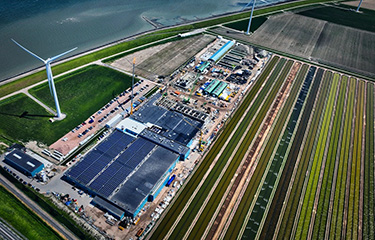The Kingfish Company said its Q1 2023 results confirm its “path to profitability,” but the company added that its phase-two plans are expected to cost more, and it has adjusted its estimates upward to EUR 95 million (USD 104 million).
The company reported earning EUR 5.6 million (USD 6.1 million) from sales of its yellowtail in Q1 2023, up 55 percent year-over-year. That higher sales total was coupled with an increased revenue per kilogram, up EUR 0.60 (USD 0.66) per kilogram compared to the previous quarter.
“It has been a great start of the year for the Kingfish Company, with record sales and continuous production improvements,” Kingfish Company CEO Vincent Erenst said in a release. “The demand for our high-quality product is strong across all our markets, and we are preparing to increase production to meet growing demand.”
The company also announced that the commissioning of the phase-two extension of its yellowtail facility has started, including the construction of a new pumphouse and a second hatchery. The new hatchery, which began operating in January 2023, has already produced “high-quality fingerlings,” the company said.
Kingfish said after an "extensive review” of its construction process for its new facilities, the “planning has been adjusted,” with construction on the first of three grow-out systems now to begin in May 2023 and the final system to be built starting in September 2023.
“The new timeline is mainly a result of delayed development of automation systems and software,” the company said.
As a result, the Kingfish Company has adjusted its capital expenditure projections upward to EUR 95 million (USD 104 million).
Despite the increased capex costs for its phase-two operation, Kingfish said its Q1 results continued to demonstrate its “path to profitability.” Along with the better revenue per kilogram, the company said its earnings before interest, taxes, depreciation, and amortization (EBITDA) per kilogram increased, to a loss of EUR 2.60 (USD 2.87) per kilogram of fish – a 51 percent improvement year-over-year. Along with that, the company said its operational EBITDA improved by 38 percent, to a loss of EUR 3.9 million (USD 4.3 million).
Increased scale and the maintenance of a steady-state capacity, which it did for the fourth-consecutive quarter, helped earnings, the company said. Its phase-one operations produced 421 metric tons (MT) of yellowtail in Q1. The company said it also saw increased productivity in its 54th production cycle, along with a reduced feed-conversion ratio and no mass mortality events.
The delay of its phase-two construction, the company said, will not have any impacts on its 2023 harvest volume. The first harvest from the phase-two development is expected to take place in Q1 2024, and it will reach steady-state capacity by Q4 2024, the company said.
Photo courtesy of The Kingfish Company







